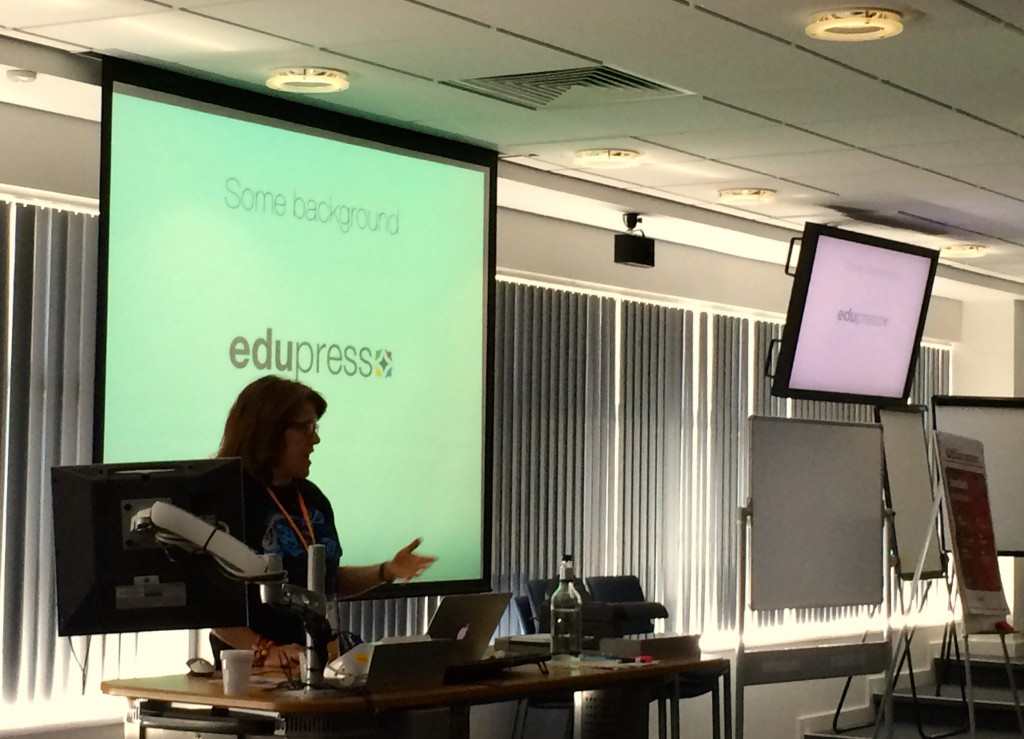
If you would like to know more please contact
Dr Zulfiqar Khan (Associate Professor)
Director Sustainable Design Research Centre
Latest research and knowledge exchange news at Bournemouth University

If you would like to know more please contact
Dr Zulfiqar Khan (Associate Professor)
Director Sustainable Design Research Centre
I have been leading final year Design & Engineering “Advanced Technology & Innovation” unit. This is a 40 credit unit and 50% of the course work is assessed through a research publication.
During this unit the students had the opportunity to choose a topic for research within the area of coatings including nano coatings, structural integrity (corrosion simulation and modelling), thermodynamics, renewable energy and materials. These areas of research are supported through state-of-the-art experimental and analytical resources in Sustainable Design Research Centre and supported by significant industrial collaborations.
Final year design engineering students have been actively engaged with the research activity and were successful in publishing the following journal (open access) and conference papers.
Nugent, M., & Khan, Z. (2014). The effects of corrosion rate and manufacturing in the prevention of stress corrosion cracking on structural members of steel bridges. The Journal of Corrosion Science and Engineering JCSE, 17(16). Retrieved from http://www.jcse.org/
Grover, M., & Khan, Z. (2014). The Comparison on Tool Wear, Surface Finish and Geometric Accuracy when turning EN8 Steel in Wet and Dry Conditions. In M. Grover (Ed.), World Congress on Engineering 2014: The 2014 International Conference of Manufacturing Engineering and Engineering Management (pp. 1093-1097). Imperial College London: Newswood Limited International Association of Engineers. Retrieved from http://www.iaeng.org/WCE2014/index.html
Wilton-Smith, K., Khan, Z., Saeed, A., & Hadfield, M. (2014). Accelerated Corrosion tests of Waste-gated Turbocharger’s Adjustable and Fixed End Links. In High Performance and Optimum Design of Structures and Materials Vol. 137 (pp. 501-508). Southampton: Wessex Institute of Technology, UK. doi: 10.2495/HPSM140461
Dobson, P., & Khan, Z. (2013). Design considerations for carbon steel pipes materials’ selection applied in fossil powered plants subjected to wet-steam flow accelerated- corrosion review paper. Journal of Corrosion Science and Engineering, 16, 1-13. Retrieved from http://www.scopus.com/source/sourceInfo.url?sourceId=12326&origin=recordpage
Denham, L., & Khan, Z. (2013). The prevention of corrosion and corrosion
stress cracking on structural members of
fixed deep sea oil rigs. The Journal of Corrosion Science and Engineering, 16, 1-13. Retrieved from http://www.jcse.org/
The paper “The Comparison on Tool Wear, Surface Finish and Geometric Accuracy when turning EN8 Steel in Wet and Dry Conditions” was accepted in the World Congress on Engineering 2014 organised by International Association of Engineers (IAENG) at the Imperial College London 2-4 July 2014. This paper was presented at the conference. This paper has now been selected to be contributed as a book chapter which will be published by Springer.
“We are happy to inform you that Springer has invited us to publish the edited book [ Transactions on Engineering Technologies – World Congress on Engineering 2014] for our WCE 2014 and we are now inviting our WCE 2014 conference participants of selected papers for the edited book.” [extract from invitation].
Dr Zulfiqar Khan (Associate Professor)
Director Sustainable Design Research Centre
SciTech
Innovators from across the energy industry and SME community are being invited to enter the UK’s leading energy innovation awards which showcase and celebrate outstanding projects, technologies and talent making a real impact in the energy sector.
Now in its fifth year, the UK Energy Innovation Awards 2015, will unite figureheads of the energy industry and the innovation community in a high profile event to celebrate the best innovations across the electricity and gas networks including the renewables sector.
Following an unprecedented number of high calibre entries last year, the awards, organised by the Energy Innovation Centre and supported by leaders from the major energy companies, has been refreshed and extended to include new categories which reflect the diversity of entries in previous years.
These updated categories include:
Altogether there will be 14 categories with the closing date for entries on Friday, December 12th. A black tie awards ceremony will be held in Manchester on April 30th featuring leaders from across the energy networks. Entries can be made online by visiting www.energyinnovationcentre.com
Chief executives from across the energy industry will be on the judging panel including Northern Gas Network’s chief executive and Energy Innovation Centre chairman Mark Horsley.
Last year, the awards attracted more than 370 guests from the electricity, gas and offshore renewables sectors along with innovators from a wide range of small businesses, start-up companies and academia.
Amongst the winners were Open Grid Systems which won the ‘International Trade Award’ in recognition of strong overseas sales of its tablet application which gives network operators an augmented reality view of assets out in the field, the first tool of its kind. Other technologies recognised included a robotic system which internally repairs leaking cast iron mains, the UK’s first ‘smart grid’ in Orkney and a unique technology to allow keyhole excavations on highways and roads.
Denise Massey, managing director of the Energy Innovation Centre, said: “The UK innovation scene has continued to grow and develop so much since the awards began back in 2010 and we are proud to have been able to contribute to this. With this in mind, we look forward to seeing a diverse and exciting range of entries representing the continued improvements happening in the sector.
“The Energy Innovation Centre exists to encourage this important collaboration between external innovators and the energy industry by modernising the networks and revolutionising the way electricity and gas is delivered. It’s clear the industry is alive with an incredible number of talented, creative and forward thinking problem solvers, engineers, technologists, and academics so we look forward to seeing the entries.”
The full list of categories includes:
For category sponsorship opportunities, please contact Out There Events on 0161 946 6262 or email ellie@outthereevents.com.
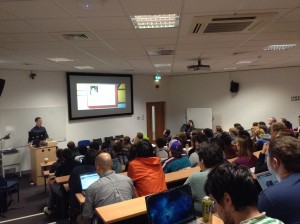
Yesterday, we held the first of this academic year’s cyber security seminars. We hosted Dr John Lyle from Facebook, who spoke to a packed audience in the Barnes Lecture Theatre about some of the challenges fighting spam at Facebook. After his talk, John described how impressed he was with some of the thought provoking questions raised by audience.
Our next seminar will be on Tuesday, 25th November and will be delivered by Dr Andrea Atzeni from the Computer and Network Security group at Politecnico di Torino. Andrea will be visiting us that week as part of our Fusion funded Bournemouth European Network in Interdisciplinary Cyber Security (BENICS) project. Watch this space for more details about Andrea’s talk.
Our interdisciplinary seminar series on Cyber Security is a wonderful opportunity to hear interesting, thought-provoking talks on a variety of topics related to security and privacy. Although some of these speakers will be academic, their talks will be approachable and require nothing more than a general interest in security, and an enquiring mind. We’re also interested in ideas about possible speakers or seminar topics, so please get in touch if you have any suggestions.
 CIPPM Researchers Professor Maurizio Borghi, Dr. Marcella Favale, Dr. Fabian Homberg, Mr. Conor O’Kane, Mr. Bartolomeo Meletti, Dr. Dinusha Mendis and Professor Ruth Towse attended the All-Hands Meeting hosted by CREATe, University of Glasgow on 15-16 September 2014.
CIPPM Researchers Professor Maurizio Borghi, Dr. Marcella Favale, Dr. Fabian Homberg, Mr. Conor O’Kane, Mr. Bartolomeo Meletti, Dr. Dinusha Mendis and Professor Ruth Towse attended the All-Hands Meeting hosted by CREATe, University of Glasgow on 15-16 September 2014.
Set in the beautiful Mackintosh Suite of House for an Art Lover (designed by Charles Rennie Mackintosh), the event showcased the projects and associated projects of CREATe’s consortium members. It also provided an opportunity to stage the projects through the medium of exhibition posters thereby capturing the creativity of the research – very much the theme of the two days.
The involvement of CIPPM Researchers in various CREATe projects led to a number of posters and presentations.
CIPPM, Co-Director, Professor Ruth Towse, Principal Investigator of the project, ‘Historical Analysis of the Role of Copyright in Music Publishing’ presented the research on the economic survival of the music publishing industry. CIPPM Director, Professor Maurizio Borghi and CIPPM Research Assistant Hyojung Sun also forms part of this team together with Professor Fiona MacMillan of Birkbeck College, University of London.
CIPPM Research Fellow, Dr. Marcella Favale presented her research carried out with CREATe Director and CIPPM Visiting Professor, Professor Martin Kretschmer and Professor Paul Torremans of University of Nottingham. The project titled ‘Is there a EU Copyright Jurisprudence’ attempts to understand how copyright jurisprudence is created.
CIPPM Member and Lead Producer of the project, Mr. Bartolomeo Meletti, presented the research on Copyrightuser.org Funded initially by Bournemouth University’s Fusion Investment Fund and extended by RCUK funding provided by CREATe, copyrightser.org is an online resource aimed at making UK copyright law accessible to creators and members of the public. It is a joint project between CIPPM, CREATe and the Centre for Media Practice (CEMP) at Bournemouth University.
CIPPM Co-Director and Principal Investigator of Copyrightuser.org, Dr. Dinusha Mendis and CIPPM Copyright Researcher and PhD Candidate Ms. Hayleigh Bosher forms part of the project together with leading UK copyright experts and various academic contributors who also form part of the copyrightuser.org team.
At the event, Dr. Dinusha Mendis was invited to speak in the ‘Rump Plenary Session’ (5 New Things for CREATe to Think About). In this context, Dr. Mendis spoke about her research on 3D Printing and IP Law.
CIPPM Member, Dr. Fabian Homberg presented his research carried out together with Dr. Kris Erickson (CREATe Research Fellow) and Professor Martin Kretschmer. Titled, ‘Kickstarter Loves the Public Domain’ the project considers how copyright works in the public domain are valued – with the focus on the poster/presentation being on the Kickstarter element of the project.
CIPPM Visiting Professor, Professor Paul Heald and CIPPM Co-Director, Dr. Dinusha Mendis also forms part of this project together with a number of other collaborators.
Applications will be assessed on a rolling basis and the fund will close on 31 October 2014.
More information can be found here.
Alternatively please feel free to contact
Jayne Codling – Knowledge Exchange Adviser
Ext 61215 jcodling@bournemouth.ac.uk
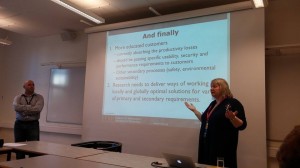
On Monday, BU researchers co-organised a workshop on Evolving Security and Privacy Requirements Engineering (ESPRE) at the 22nd IEEE International Requirements Engineering Conference (RE 2014) in Karlskrona, Sweden. The workshop brought together practitioners and researchers from around the world, who shared their thoughts about how security and privacy can be incorporated into the design of software as early as possible, without compromising productivity or sacrificing innovation. The RE conference series is one of the premier conferences in software engineering, and the ESPRE workshop is the successor of several successful secure software engineering workshops. Shamal Faily (SciTech) organised this workshop, together with colleagues from Germany (University of Duisberg-Essen), South Korea (Ajou University), and the USA (Carnegie Mellon University).
The workshop began with a keynote talk from Professor Angela Sasse (UCL), who described some recent research examining how companies build security into products they develop, and the need to change the discourse around usability and security. Three technical paper sessions followed, before the workshop was concluded with an invited talk by Aljosa Pasic (Atos Research & Innovation) on some of the market trends and business challenges in security engineering. Further information about the workshop itself can be found at http://espre2014.org .
We’re grateful to the Faculty of Science & Technology for co-sponsoring this workshop, and to all the workshop attendees for sharing their work.
Dr Nigel Garland and Dr Zulfiqar Khan have been awarded funding through the Fusion Investment Fund, Co-Creation stream, to develop a novel Surgical appliance for the Cardiac Intervention Unit at Royal Bournemouth Hospital. The device is a left arm radial support to assist in Percutaneous Coronary Intervention for the treatment of Coronary Heart Disease. Approximately 65% of patients can be successfully treated using the right arm, however, this rises to 90% when the left arm is also accessible during procedure.
Solutions will initially be designed by 1st and 2nd year undergraduate Design Engineering students of the Faculty of Science and Technology. Students will be working in mixed groups to develop concept prototypes using a combination of virtual design tools, physical space models and additive manufacturing techniques. Dr Garland and Dr Peter O’Kane of RBH will then take the design forward to full working prototype. The outcomes of this project should be available for showcasing along with the advanced methodologies deployed during the student learning process and product development.
This SBRI competition is focused on the Environment Agency’s need to measure river flows in challenging locations where existing standard instrumentation cannot be used. However, a solution that could also be deployed in less demanding/normal river conditions would be ideal.
New SBRI call – Up to £500k of funding is available for this Phase 1 competition.
MOD’s Centre for Defence Enterprise (CDE) are launching a call for research proposals to identify new and innovative science and technology to enhance the level of military medical care and support to service personnel.
This CDE competition aims to promote military resilience and preparedness through:
Challenge 1. Technologies for health surveillance
Predicting injury, infection or disease in a military population on operations helps maintain fighting ability. This challenge seeks to identify areas of physiology and biochemical pathways that, with new surveillance and analysis technology, can provide novel ways of assessing health and wellbeing.
Challenge 2. Advanced medical systems for field care
Post-Afghanistan, operational medicine will evolve. Future medical capability will rely on smart, innovative, less logistically intense ways of diagnosing and treating medical emergencies. This challenge seeks innovative technologies that can be used routinely by non-specialists in an operational setting to diagnose the cause and severity of injury or illness and assist in providing care.
A free briefing event will take place at the CDE Tuesday 30 September 2014 in Scotland.
Further details can be accessed via the website.
Please join us today for a cyber security seminar on:
“Reduction of Access Control Decisions”
Coyne Lecture Theatre
4pm – 5pm
Speaker: Dr. Nicola Zannone (Eindhoven University of Technology)
Access control has been proposed as “the” solution to prevent unauthorized accesses to sensitive system resources. Historically, access control models use a two-valued decision set to indicate whether an access should be granted or denied. Many access control models have extended the two-valued decision set to indicate, for instance, whether a policy is applicable to an access query or an error occurred during policy evaluation. Decision sets are often coupled with operators for combining decisions from multiple applicable policies. Although a larger decision set is more expressive, it may be necessary to reduce it to a smaller set in order to simplify the complexity of decision making or enable comparison between access control models. Moreover, some access control mechanisms like XACML v3 uses more than one decision set. The projection from one decision set to the other may result in a loss of accuracy, which can affect the final access decision. In this talk, we present a formal framework for the analysis and comparison of decision sets centered on the notion of decision reduction. In particular, we introduce the notion of safe reduction, which ensures that a reduction can be performed at any level of policy composition without changing the final decision. We demonstrate the framework by analyzing XACML v3 against the notion of safe reduction. From this analysis, we draw guidelines for the selection of the minimal decision set with respect to a given set of combining operators.
Speaker Bio: Nicola Zannone received the Ph.D. in Computer Science at the University of Trento in 2007. He won the IBM PhD fellowship award for the 2006-07 academic year. He visited the Center for Secure Information Systems at George Mason University in 2005 and at IBM Zurich Research Laboratory in 2006. In 2007-2008, he was a post-doc at the Department of Computer Science of the University of Toronto. In 2008-2012, he has a post-doc position in the Security Group at the Eindhoven University of Technology. Since November 2012, he is assistant professor in the same group. His research interests include computer security, formal methods, privacy and data protection.
The Horizon 2020 programme is the major funding opportunity for research and innovation initiatives across Europe, and in 2015 there is nearly 600 million Euros available. If this is an area that interests you, it’s worth bookmarking the European Creative Business Network website .
Save the date!
Creative industries will benefit from some of this funding in the next round of calls published on the 15 October 2014, as the topics have already been announced. Here are some of the highlights for creative businesses:
ICT 19: Technologies for creative industries, social media and convergence
This funding aims to support Research and Innovation Actions, or Support for the development of, new or emerging technologies for digital content creation and to unlock complex information and media and interacting with them.
ICT 20: Technologies for better human learning and teaching
The development of digital technologies for learning are crucial to boosting innovation in education. This call will therefore focus on innovative technologies for learning, on underpinning interoperability standards and on the integration of different components into smart learning environments.
ICT 10: Collective Awareness Platforms for Sustainability and Social Innovation – Leadership in enabling and industrial technologies.
By Collective Awareness Platform, the call basically means website or ‘portal’. They are interested in calls that pioneer crowdsourcing/crowdfunding or other forms of social innovation. They want to fund technological solutions to real world problems and are looking beyond the financial impact of the project towards the difference it makes to society.
More details of all of these calls are in the Draft Work Programme.
Dr. Dinusha M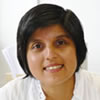 endis, Co-Director of the Centre for Intellectual Property Policy and Management (CIPPM) and Associate Professor in Law was recently invited to present her research in 3D printing and Intellectual Property (IP) law in Helsinki and Nottingham. Dinusha also hosted an event on this topic at Bournemouth University’s Festival of Learning in June 1014.
endis, Co-Director of the Centre for Intellectual Property Policy and Management (CIPPM) and Associate Professor in Law was recently invited to present her research in 3D printing and Intellectual Property (IP) law in Helsinki and Nottingham. Dinusha also hosted an event on this topic at Bournemouth University’s Festival of Learning in June 1014.
In April 2014, Dinusha was invited by the Department of Commercial Law at the Hanken School of Economics in Finland to present her most recent research in 3D printing and IP Law. The talk titled ‘Law and Technological Change: – 3D Printing Technology, New Business Models and Intellectual Property Law‘ explored the paths that intellectual property law may take in the adoption of 3D printing technology with particular emphasis on the utility of “law and technology” as a research method.
In June 2014, Dinusha hosted an event on ‘3D Printing: Understanding the Technology and Law’ at Bournemouth University’s Festival of Learning. The event was run in collaboration with the Media School and the School of Science and Technology. Further details about this event can also be found here.
In July 2014, Dinusha was invited to present her research at the 9th Annual Additive Manufacturing and 3D Printing International Conference. The event hosted by the University of Nottingham and Econolyst Ltd., brings together industry experts from the field of Additive Manufacturing and 3D printing. As an invited speaker, Dinusha spoke on the ‘The Application of UK Copyright Law to 3D Printing and Mass Customisation’. A further insight into the talk can also be found on the Conference blog under the heading ‘Who is the creator: where does UK law stand on IP in 3DP?’
Dinusha continues to carry out both funded and independent research in this area and her most recent article titled ‘3D Printing Enters the Fast Lane’ was published in the Intellectual Property Magazine in July 2014.
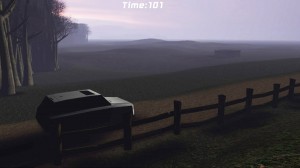 The FIF funded collaborative project between the Creative Technology and Archaeology Frameworks has produced its first output.
The FIF funded collaborative project between the Creative Technology and Archaeology Frameworks has produced its first output.
The aims of the project are to:
In the first of a series of projects a Games Technology student has collaborated with a Forensic Archaeology student to produce 3D environments for use in experiments investigating how individuals interpret and respond to features in the environment. We are now looking to participants to perform the experiment. Please email djohn@bournemouth.ac.uk or i7208298@bournemouth.ac.uk if you want to take part in the experiment.
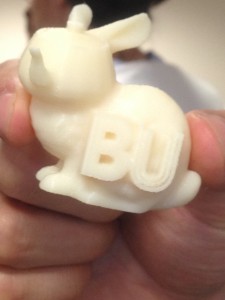 On Monday 9 June, Dr. Dinusha Mendis of the Law Department hosted an event on ‘3D Printing: Understanding the Technology and Law’ at Bournemouth University’s Festival of Learning in collaboration with the Media School and School of Science and Technology.
On Monday 9 June, Dr. Dinusha Mendis of the Law Department hosted an event on ‘3D Printing: Understanding the Technology and Law’ at Bournemouth University’s Festival of Learning in collaboration with the Media School and School of Science and Technology.
The event which was held from 5-7 pm on 9th June 2014 included three short presentations and a tour of the 3D printing facilities at Bournemouth University.
The presentations focused on the various aspects of the technology and law relating to 3D Printing and were delivered by Dr. Leigh McLoughlin of the Media School; Mr. Gary Underwood from the School of Science and Technology and Dr. Dinusha Mendis of the Law Department, Business School.
Following the talks, the attendees were taken on a hands-on tour of the 3D printing facilities at Talbot Campus, Bournemouth University – and did not leave the event empty-handed. Each attendee was given a 3D printed momento to take home – as seen in the picture!
The event was enjoyable and very well attended – generating a wait list after the allocated tickets were sold out. Apart from that, the Festival of Learning provided the perfect platform to showcase the research relating to the legal and technological implications of 3D Printing. With a hands-on tour planned, it also provided the opportunity to engage the attendees in a more light-hearted manner.
The Festival of Learning has also acted as a spring board for a further event in the area of 3D Printing and Intellectual Property Law which will once again be hosted by Dr. Dinusha Mendis at Bournemouth University later this year.
The following video clip captures the essence of the Festival of Learning and provides an insight into the many exciting events which took place during 9-15 June 2014 at Bournemouth University.
Staff, students and members of the public are invited to join us for the next cyber security seminar on:
Tuesday, 29th July
Coyne Lecture Theatre
4pm – 5pm
‘Reduction of Access Control Decisions’
Speaker: Dr. Nicola Zannone (Eindhoven University of Technology)
Access control has been proposed as “the” solution to prevent unauthorized accesses to sensitive system resources. Historically, access control models use a two-valued decision set to indicate whether an access should be granted or denied. Many access control models have extended the two-valued decision set to indicate, for instance, whether a policy is applicable to an access query or an error occurred during policy evaluation. Decision sets are often coupled with operators for combining decisions from multiple applicable policies. Although a larger decision set is more expressive, it may be necessary to reduce it to a smaller set in order to simplify the complexity of decision making or enable comparison between access control models. Moreover, some access control mechanisms like XACML v3 uses more than one decision set. The projection from one decision set to the other may result in a loss of accuracy, which can affect the final access decision. In this talk, we present a formal framework for the analysis and comparison of decision sets centered on the notion of decision reduction. In particular, we introduce the notion of safe reduction, which ensures that a reduction can be performed at any level of policy composition without changing the final decision. We demonstrate the framework by analyzing XACML v3 against the notion of safe reduction. From this analysis, we draw guidelines for the selection of the minimal decision set with respect to a given set of combining operators.
Should you wish to attend the seminar, please book your place via Eventbrite.
Speaker Bio: Nicola Zannone received the Ph.D. in Computer Science at the University of Trento in 2007. He won the IBM PhD fellowship award for the 2006-07 academic year. He visited the Center for Secure Information Systems at George Mason University in 2005 and at IBM Zurich Research Laboratory in 2006. In 2007-2008, he was a post-doc at the Department of Computer Science of the University of Toronto. In 2008-2012, he has a post-doc position in the Security Group at the Eindhoven University of Technology. Since November 2012, he is assistant professor in the same group. His research interests include computer security, formal methods, privacy and data protection.
Yawning is a fascinating conundrum that has intrigued clinical researchers, neuroscientists, and philosophers for centuries. Researchers are largely in agreement on the localisation of the process of yawning in the paraventricular nucleus of the hypothalamus and the brainstem, important regions of the brain known to regulate our body temperature and circadian rhythms, and are vital to our functioning.
However, agreement is yet to be reached on which neuro-chemicals are fundamental to yawning, albeit a number of neurotransmitters have been identified that may be associated.
Recently, the Thompson Cortisol Hypothesis has proposed that the incidence of yawning is associated with rise in cortisol levels. It suggests that cortisol is a trigger for the yawn reflex or is an artefact that may protect the yawner. It is still unclear how this mechanism may work within the Hypothalamus-Pituitary-Adrenal axis but is likely to work within the hypothalamus temperature regulation theories such as those proposed by Dr Andrew Gallup in the United States.

Stress and fatigue are known to cause elevations in cortisol which is an essential component of the stress response and immune system regulation and consequently is sensitive to the impact of neurological disorders such as Multiple Sclerosis.
“Nerve impulses, cortisol levels, and yawning as a potential predictor of neurological impairment” was presented at the recent International Conference for Academic Disciplines at the Universita’ Ca’ Foscari Di Venezia, Venice, Italy, 30 June to 3 July 2014. This described the four years of research I have been conducting at Bournemouth University into yawning.
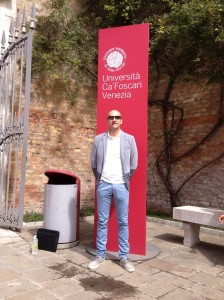 It was exciting to meet interested researchers and to exchange ideas on this common but little understood phenomenon. I was also surprised and delighted to receive the Certificate of Merit for “Outstanding Research and Presentation” which just added to the outstanding beauty of the conference location in Venice.
It was exciting to meet interested researchers and to exchange ideas on this common but little understood phenomenon. I was also surprised and delighted to receive the Certificate of Merit for “Outstanding Research and Presentation” which just added to the outstanding beauty of the conference location in Venice.
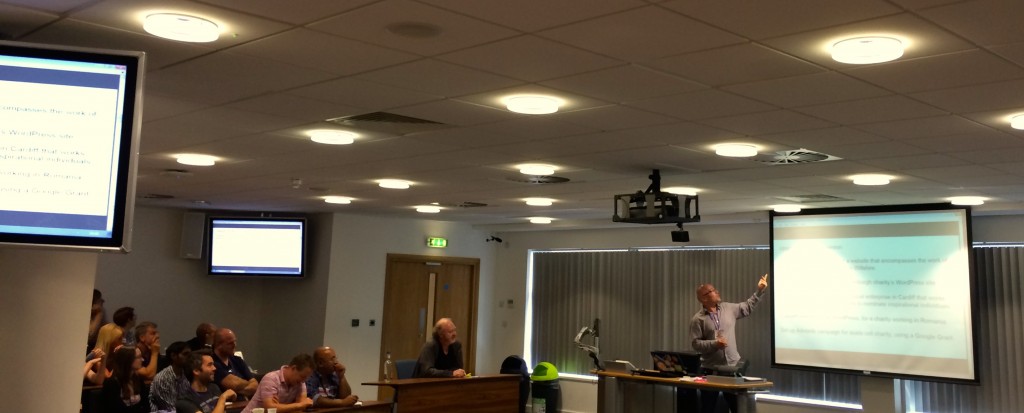 This weekend BU has been playing host to a fantastic group of the nation’s best and brightest WordPress Developers for the 7th annual WordCamp UK event. The event is a chance for the community of WordPress developers to come together, share ideas and experiences, and provide each other with support and advice. Over 100 people attended the event, coming both from the local conurbation, and from further afield – in particular one gentleman had come all the way from Spain!
This weekend BU has been playing host to a fantastic group of the nation’s best and brightest WordPress Developers for the 7th annual WordCamp UK event. The event is a chance for the community of WordPress developers to come together, share ideas and experiences, and provide each other with support and advice. Over 100 people attended the event, coming both from the local conurbation, and from further afield – in particular one gentleman had come all the way from Spain!
Arriving Saturday morning I had the basics of WordPress down, having previously developed a free website for a local community event that consists of a few different pages and a blog feed. Talks have been submitted to the running order by the attendees of the conference in advance, giving people a selection of topics to pick and choose from depending on their interests. Sessions have been hugely varied, for example: “A beginners guide to web accessibility”, “Learning to sell your services as a web designer”, “Designing with data”, and “How not to launch a startup”. One of the most helpful sessions from my perspective as a novice WordPress user was a series of 5 minute lightening talks on topics such as the importance of password security (to find out how long it would take a hacker to crack your password head to How big is your haystack?), how to set up a developer event, and a poetic recital of how to problem solve your website issues.
As well as attending the talks I’ve also benefitted from one of one tuition from other attendees on how I can develop sites offline and what plugins I could add to sites to make them more interesting and useful for the end user, all for no extra cost. Overall this has been a fantastic insight into the power of WordPress and how I can use it to support my own projects and events at a minimal cost. Considering tickets were just £10, I think there has been fantastic value in the weekend’s activities and I would recommend to anyone with an interest in WordPress (professionally or privately) to consider attending future WordCamps around the country. 